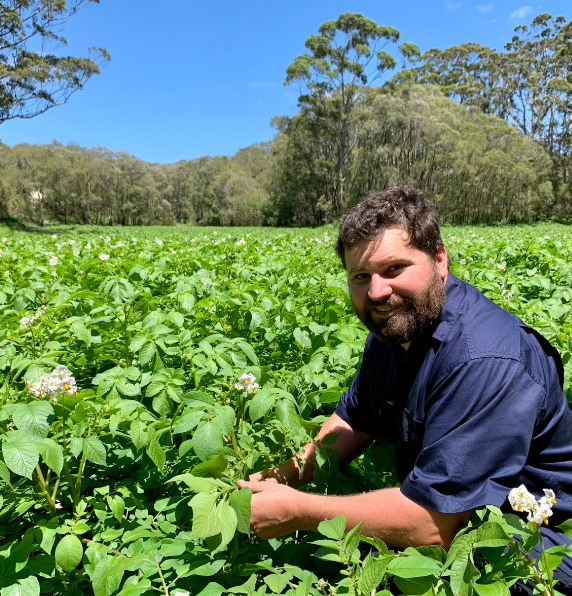
17 Jun Get to know your growers: Julian Ackley
Potato seed growing specialists the Ackleys along with their neighbours, the Westcotts, are proudly continuing the legacy that their forebears put into motion in the 1940’s.
Located in the Cuthbert-Elleker swamp areas in Albany, the operation initially grew spuds for the potato board, eventually growing processing potatoes for Edgell, then later seed potatoes for the processing industries, and finally branching into seed potatoes for the fresh market as well.
During winter the swamps flood and go under water which eliminates any crop remnants from the previous season, crops are then grown in the narrow dry window between December and April without irrigation.
Growing quality seed is a highly skilled process – from variety selection to the micro-managing up to 30 varieties and different growth stages prior to being ready to sell. Julian provides more background in the Q&A below to his farm and the seed industry.
Q & A
- How long has your family been in the region?
In the early 40’s my grandfather Bob Ackley and his brothers came to Albany during the war to dig potatoes which was in those days by fork. Consequently, in the late 40’s my grandfather Bob Ackley purchased a swamp in Cuthbert area (about 7km from Albany) and began potato farming.
Forward to 1967, my father Terry Ackley leased the swamp from my grandfather and started growing potatoes for the board. By 1972 he was able to buy his own swamp in Cuthbert, which we still farm today. Around 1974 a school friend of my father, Chris Westcott, purchased a neighbouring swamp and a long-standing partnership was formed.
In 2010 Chris Westcott started growing seed potatoes with his son Steven Westcott on the Elleker swamps and I joined my Father farming at the Cuthbert swamp. In 2018 I purchased another swamp in Elleker, next door to Westcotts, and today we both continue the legacy our parents have created for us.
- What do you enjoy about “seed” potato farming?
There are many aspects to being a seed potato farmer that is a bit different, firstly my customers are almost all farmers. I specialise mostly in the West Australian market and operate across the fresh and processing industries, while also supporting farmer’s market growers, and supplying seed into the nursery industry.
Growing seed potatoes is a long process, from ordering mini tuber stock from the laboratories to having a product in my customers hands is a 5-6 year process and there is no return as a seed grower till the end of that process. Ordering the laboratory grown disease free tuber stock starts 18 months prior to delivery.
Each variety has its own special requirements and properly understanding that can take many seasons to master. While I will admit, like many farmers, I quite like driving a tractor, working with the plant breeders and eventually turning the varieties they have into commercial success for my customers is the greatest reward.
- Which is your favourite potato variety to eat?
As a seed grower there is no question I am spoilt for choice. When it comes to a waxy variety (for potato salad, boiling or in the slow cooker) Prince of Orange has the waxiness rivalling Kipfler that holds it together even if you overcook it. It has more flavour and a gentle sweetness that really brings it up to a whole another level. It has an agreeable texture and the natural ability to absorb the cooking flavours, in my opinion at least, it is king. Prince of Orange offers all the advantages of a Kipfler, but with none of the drawbacks, and let me add, you can mash it virtually solo, no need for garnish.
- Is there anything about potato farming that you wish consumers knew or understood better?
For me it is the fact that it is one of the healthier carbohydrates. I often meet people who will not eat spuds because they swore themselves off the carbs, yet with health benefits in mind are happy to bend the rules for a pasta or rice dish, but not a potato-based meal.
- Look into your crystal ball – where do you hope to see the WA potato industry in 5 years?
I’d like to see West Australian restaurants and retailers increase support of our local potato processors for chips and peeling stock. We have plenty of unused capacity that could be further leveraged to supply a local product grown in WA for West Australians. We may need to increase marketing around WA processed potato products to further boost consumer awareness that these products do exist and the benefits that they offer our state.
In the fresh market I hope to see improved stability. To recover some certainty as well as promote better forward planning. As a seed grower it is exceedingly difficult to forecast what spuds will be on the shelves 7 years in advance. When I order my tuber stock from the laboratory that is exactly what I am trying to do. Today’s fresh market potato growers are often uncertain of what to do just a few months in advance. This leads to inability to obtain the right seed and not being able to react and supply to the market’s requirements successfully. There is a significant risk we will lose our own market share to imports if we are no longer able to make plans for the future of our own industry.


Photo credit: drone images by Skyprints










